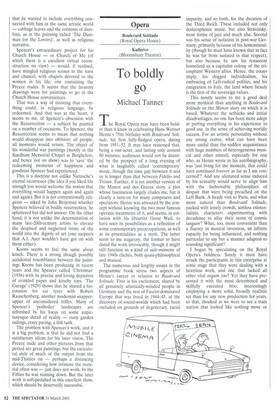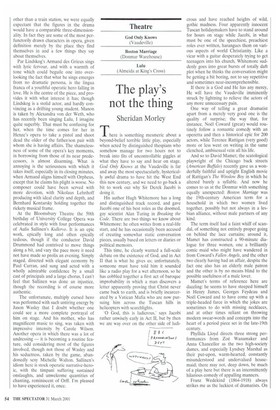To boldly go
Michael Tanner
The Royal Opera may have been bolder than it knew in celebrating Hans Werner Henze's 75th birthday with Boulevard Solitude, his first fully-fledged opera, dating from 1951-52. It may have reasoned that, being a one-acter, and lasting only around 80 minutes, audiences would not be daunted by the prospect of a long evening of what is laughably called 'contemporary' music, though the time gap between it and us is longer than that between Fidelio and Tristan. Further, it is yet another version of the Manon and des Grieux story, a plot whose fascination largely eludes me, but is clearly a turn-on for many composers and spectators. Henze was attracted by the concept without knowing the two most famous operatic treatments of it, and seems, in collusion with his librettist Grete Weil, to have seen its possibilities as a reflection of some contemporary preoccupations, as well as its potentialities as a myth. The latter seem to me nugatory, the former to have dated the work irrevocably, though it might still function as a kind of aide-rnemoire of late 1940s clichés, both quasi-philosophical and musical.
The numerous and lengthy essays in the programme book stress two aspects of Henze's career in relation to Boulevard Solitude. First is his excitement, shared by all genuinely artistically-minded people in Germany and the rest of Fascist-dominated Europe that was freed in 1944-45, at the discovery of sound-worlds which had been excluded on grounds of degeneracy, racial
impurity, and so forth, for the duration of the Third Reich. These included not only dodecaphonic music, but also Stravinsky, most forms of .077 and much else. Second was his sense of isolation in post-war Germany, primarily because of his homosexuality (though he must have known that in fact he was far from isolated in that respect), but also because he saw his renascent homeland as a capitalist colony of the triumphant Western allies. Hence, the essays imply, his dogged individualism, his embracing of Left-radical politics, and his emigration to Italy, the land where beauty is the first of the sovereign values.
This mostly seems to me a good deal more mythical than anything in Boulevard Solitude or the Manon story on which it is based. Whatever the setbacks and initial disadvantages, no one has been more adept at putting everything in his experience to good use, in the sense of achieving worldly success. For an artistic personality without any strong centre, what can have been more useful than the sudden acquaintance with huge numbers of heterogeneous musical and other stimuli, especially for one who, as Henze wrote in his autobiography, was 'just living for the moment, that could have continued forever as far as I am concerned'? And any alienated sense induced by his sexuality would serve to align him with the fashionable philosophies of despair that were being preached on the Left Bank. A heady visit to Paris, and what more natural than Boulevard Solitude, packed with lonely crowds, aimless existentialists, characters experimenting with decadence to allay their sense of cosmic languor? What, too, more convenient than a fluency in musical invention, an infinite capacity for being influenced, and nothing particular to say but a manner adapted to sounding significant?
I began by speculating on the Royal Opera's boldness. Surely it must have struck the participants in this enterprise at some stage that they were dealing with a heartless work, and one that lacked all other vital organs too? Yet they have presented it with the most determined and skilfully executed brio, interestingly employing a more solid, broadly realistic set than for any new production for years, so that, shocked as we were to see a train station that looked like nothing more or other than a train station, we were equally expectant that the figures in the drama would have a comparable three-dimensionality. In fact they are some of the most perfunctorily drawn characters in opera, given definition merely by the place they find themselves in and a few things they say about themselves.
Par Lindskog's Armand des Grieux sings with lyric fervour, and with a warmth of tone which could beguile one into overlooking the fact that what he sings emerges from no dramatic persona, is the lingua franca of a youthful operatic hero falling in love. He is the centre of the piece, and provides it with what interest it has; though Lindskog is a stolid actor, and hardly convincing as a drifting young student. Manon is taken by Alexandra von der Weth, who has recently been singing Lulu, I imagine quite superbly. That must be confusing for her, when the time comes for her in Henze's opera to take a pistol and shoot dead the older of the father/son pair with whom she is having affairs. The shamelessness of some of the opera's key moments, in borrowing from those of its near predecessors, is almost disarming. What is annoying is the seriousness with which it takes itself, especially in its closing minutes, when Armand aligns himself with Orpheus, except that he claims his plight is worse. No composer could have been served with more devotion, with Nikolaus Lehnhoff producing with ideal clarity and depth, and Bernhard Kontarsky holding together the rickety musical frame.
At the Bloomsbury Theatre the 50th birthday of University College Opera was celebrated in style with four performances of Aulis Sallinen's Kulletvo. It is an epic work, epically long and often epically tedious, though if the conductor David Drummond had contrived to move things along a bit, and vary the pace more it need not have made so prolix an evening. Simply staged, directed with elegant economy by Paul Curran, and sung and acted with a wholly admirable confidence by a small cast of principals and a large chorus, I can't feel that Sallinen was done an injustice, though the recording is of course more authentic.
The unfortunate, multiply cursed hero was performed with such untiring energy by Jason Wasley that I doubt whether one could see a more complete portrayal of him on stage. And his mother, who has magnificent music to sing, was taken with impressive intensity by Carole Wilson. Another opera in which there was a lot of undressing — it is becoming a routine feature, odd considering most of the figures involved, though not those of Wasley and his seductress, taken by the game, abandonedly sexy Michelle Walton. Sallinen's idiom here is stock operatic narrative-heroic, with the timpani suffering sustained onslaughts, and unwelcome quantities of chanting, reminiscent of Orff. I'm pleased to have experienced it, once.



























































































 Previous page
Previous page